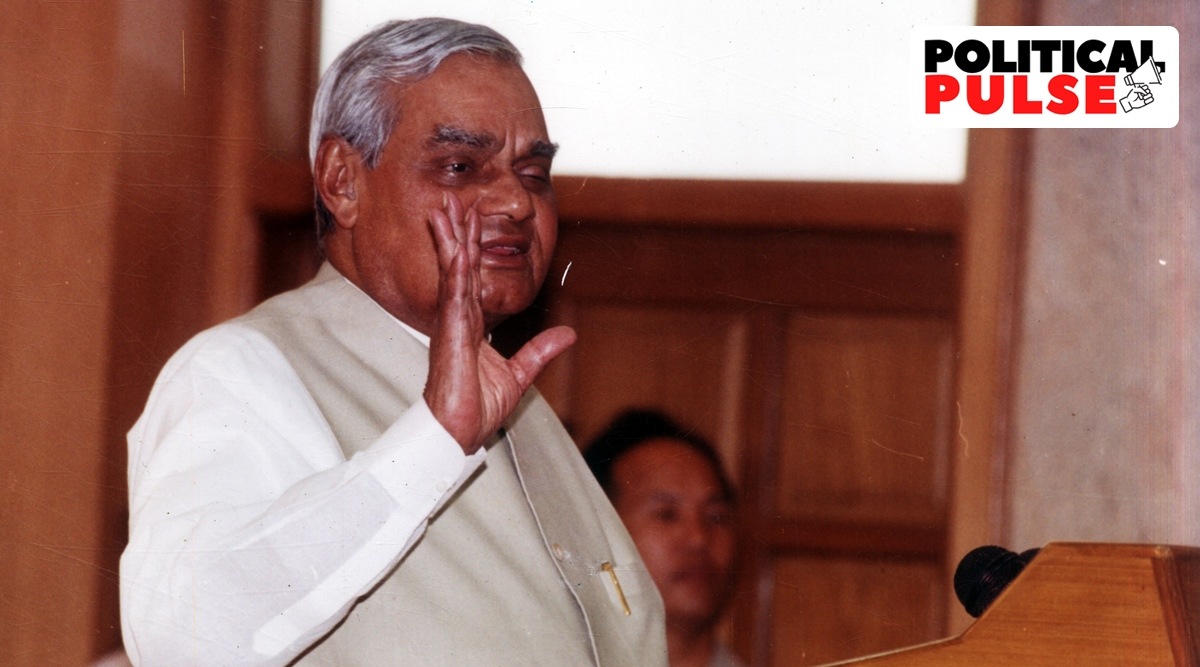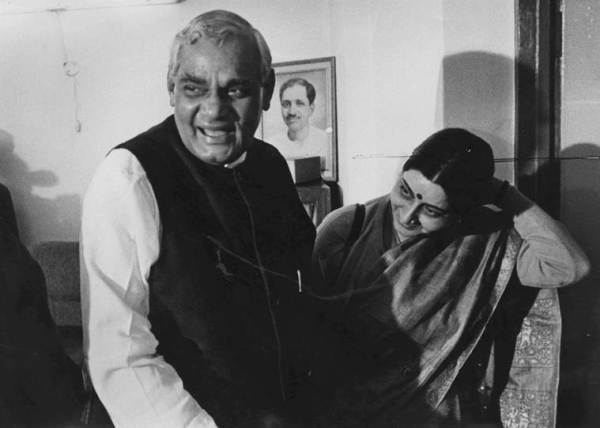 Former Prime Minister Atal Behari Vajpayee (Express archive photo)
Former Prime Minister Atal Behari Vajpayee (Express archive photo)Atal Bihari Vajpayee, the 11th Prime Minister of India, became the country’s only leader after Jawaharlal Nehru to have been sworn in as the PM during the terms of three successive Lok Sabha.
Vajpayee was a 10-term member of the Lok Sabha – from 2nd to 14th Lok Sabha barring the 3rd, 8th and 9th Lok Sabha.
Born on December 25, 1924, in Madhya Pradesh’s Gwalior, Vajpayee started participating in political activities at a young age. He joined the Quit India Movement in 1942. He became the founding member of the Bharatiya Jana Sangh (BJS) in 1951.
In 1957, Vajpayee contested the Lok Sabha election from three constituencies – Mathura, Lucknow and Balrampur – in Uttar Pradesh. He lost in Mathura (came fourth) and Lucknow (finished runner-up), but won from Balrampur. He was one of the BJS’s 4 MPs in the 2nd Lok Sabha and soon became the BJS Parliamentary Party leader.
Best of Express Premium
In 1962, Vajpayee again contested from the Balrampur and Lucknow constituencies, but lost in both seats. However, in the same year, he was elected as a member of the Rajya Sabha.
When the general elections to the 4th Lok Sabha were held, Vajpayee again contested from Balrampur and won. During his second term as a Lok Sabha member, he served as the Public Accounts Committee chairman. He also served as the BJS president during 1968-73.
In 1971, Vajpayee contested the Lok Sabha election from his home turf, Gwalior, and won comfortably by defeating a Congress candidate.
In 1977, when the general elections to the 6th Lok Sabha were held following the Emergency and all major anti-Congress forces came together, he contested on the Bharatiya Lok Dal (BLD) symbol from New Delhi and won. He also became a founding member of the Janata Party. After the polls, when the first non-Congress government, led by Morarji Desai, was formed, Vajpayee was appointed as the external affairs minister. However, the government could not complete its tenure.
When elections to the 7th Lok Sabha were held in 1980, Vajpayee was again elected from the New Delhi constituency, although this time he won on the Janata Party ticket.
 Kalyan Singh with Atal Bihari Vajpayee, L K Advani, Kanshi Ram and Mayawati. (Express archives)
Kalyan Singh with Atal Bihari Vajpayee, L K Advani, Kanshi Ram and Mayawati. (Express archives) On April 6, 1980, Vajpayee and other former BJS leaders broke away from the Janata Party and founded the Bharatiya Janata Party (BJP). Subsequently, he became the president of the fledgling BJP and remained in this post till 1986.
Vajpayee contested from Gwalior seat in the 1984 polls, but lost to the Congress’s Madhavrao Jiwajirao Scindia. Two years later, he became a member of the Rajya Sabha, which was his second term in the Upper House.
In the elections to the 10th Lok Sabha in 1991, Vajpayee contested from Lucknow and won. Congress veteran P V Narasimha Rao took over as the PM after the polls.Vajpayee was Leader of Opposition in the Lok Sabha during 1993-96.
In the 1996 general elections, Vajpayee was again re-elected from Lucknow, even as the BJP emerged as the single largest party by winning 161 of the total 471 seats it contested. As the leader of the largest party, he was invited by the President to form the government. He took oath as the PM – the first BJP leader to do so – on May 16, 1996, but could remain in office for only 13 days. As he could not prove his government’s majority on the floor of the House, he resigned as the PM on May 27.
 Atal Behari Vajpayee at his press conference with Sushma Swaraj at BJP office in 1996. (Express archive photo by Naveen Jora)
Atal Behari Vajpayee at his press conference with Sushma Swaraj at BJP office in 1996. (Express archive photo by Naveen Jora) While replying to the debate on the motion of confidence in the Lok Sabha then, Vajpayee said, “Party todakar, satta ke lie naya gathabandhan karake agar satta haath mein aatee hai to main aisee satta ko chimate se bhee chhoona pasand nahin karoonga. (I would not like to touch such power even with tongs if that power comes in hand by breaking a party or by forming a new alliance for power.)”
Afterwards, the United Front government was formed with the Congress’s outside support and Vajpayee again became Leader of Opposition in the Lok Sabha. The UF government could however only survive for less than two years.
The elections to the 12th Lok Sabha were held in 1998, in which the BJP won 182 of the total 388 seats it contested and emerged as the single largest party. Heading a multi-party alliance, National Democratic Alliance (NDA), Vajpayee again took oath as the PM. This time, his government survived for 13 months until it was brought down by one vote.
When the general elections to the 13th Lok Sabha were held in 1999, the BJP again won 182 of the total 339 seats it contested. Vajpayee again took over as the PM for the third time and remained in office till the 2004 general elections, which the NDA lost.
Vajpayee, who was widely respected as a statesman across the political spectrum, was also a writer and poet, who was known for his great oratory skills.
- The Indian Express website has been rated GREEN for its credibility and trustworthiness by Newsguard, a global service that rates news sources for their journalistic standards.

